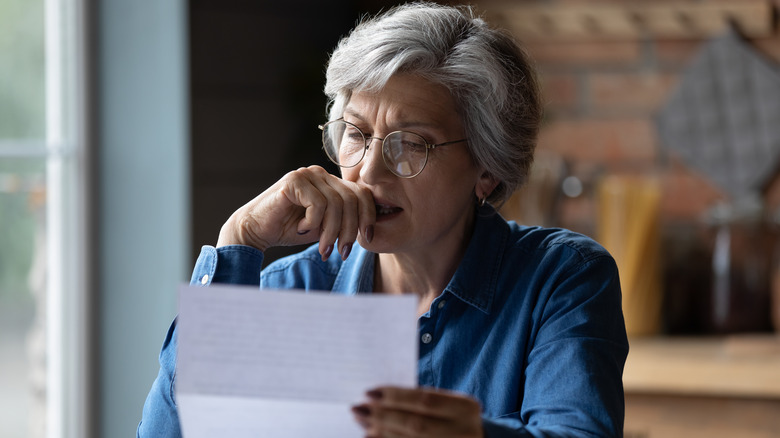What Dying People Want You To Know, According To A Top Palliative Care Doctor
Death can be a complex journey for both the individual and a person's loved ones. Many times, conversations about death occur once a person has already passed, but there are many topics that can be discussed before death occurs.
The first step in learning the wishes and desires of your loved ones, as well as advocating for your own choices, is becoming aware of which questions should be asked and lending a listening ear to people who are going through an end-of-life journey. In an exclusive interview, Health Digest spoke with Dr. Simran Malhotra, MD, a triple board-certified physician, who was named a "Top Doc" by Baltimore Magazine in 2019 and 2020 for palliative medicine, to learn what dying people want you to know. She is making it her mission to amplify the voices of people who are faced with end-of-life conversations. "When it comes to medical decision making, my mentor always used to tell patients 'You are the boss' and now it's something I tell all of my patients that are capable of making their own complex medical decisions," says Dr. Malhotra. To spread the word, here are the things that dying people want you to know.
I need support while making difficult decisions
There are countless decisions posed to people facing end-of-life experiences. The intensity of decisions people who are dying must make can compound physical and emotional stress, so having loved ones around them who can act as pillars of support can be extremely beneficial. "In my experience, patients often appreciate and want the love, support, and guidance from their families in the unchartered territory of making difficult medical decisions," says Dr. Malhotra.
A helpful way to support a loved one is to respect their decisions and honor that their end-of-life journey is uniquely theirs. "I often hear family members wanting to support their loved one in whatever decision they choose for themselves without clouding it with their input," Dr. Malhotra reveals. "For family members, I often remind them that they know the patient best, which means chances of them providing support to help make the difficult decision-making process easier will be better than someone who doesn't know them. Family and loved ones often know what is most important to the person in terms of quality of life so they can ask good questions to help the patient make a better-informed decision."
I took care of my affairs so you wouldn't have to
People facing death can experience an array of intense emotions, including anxiety, guilt, and fear. Many of these emotions are heightened when thoughts of how a person's death will affect their loved ones, from the emotional toll loss will place on them to potential financial burdens. "My seriously ill patients often worry about leaving their families behind as well as leaving them with financial and emotional burdens. It is important for them to share that all their affairs are in order (medical wills, insurance, funeral plans, etc.). And when they are not, this is often a high priority, in which case they often need to ask their family to help collect important documents or make phone calls so they can get their affairs in order," says Dr. Malhotra. If the latter scenario occurs, a person's support system can gather to offer guidance and work together in sorting out all necessary affairs.
Traditionally, discussing end-of-life affairs being in order primarily referenced legal, financial, and medical documents. But in today's technological world, there are digital matters that can also be addressed before death. "In this new tech world, sharing passwords for email, social media accounts, and digital photos are important for today's families," shares Dr. Malhotra.
This is what I need
A specialist in palliative care, Dr. Malhotra shares that in her experiences with patients and their families, each dying person's needs are unique. "[The] majority of people just want to know that they are not alone and that their loved ones are there for them. This can be simple things like holding their hand, or giving them a hug, to more involved support like helping make difficult decisions about care and treatment. Some patients have expressed just wanting their loved one's presence in the room, even if silently, would give them a sense of comfort and support. I have found that people are seeking empathy and compassion from their loved ones, and this can be as simple as being present, listening and not judging them," expresses Dr. Malhotra.
Complex, deep emotions will arise throughout the end-of-life journey. "Another thing patients want to give and receive from their loved ones is emotional closure. They want to say and hear 'I'm sorry,' 'Please forgive me,' 'Thank you,' and most importantly 'I love you.' These are the things that people want to hear," observes Dr. Malhotra. "Many patients have expressed wanting their loved ones to continue to live in peace, despite their grief and anger, knowing that they did the best they could to advocate for them and that they need to forgive themselves for anything they feel they could have done differently. They don't want them to live with guilt or pain," explains Malhotra.
When the time comes, this is how I want to die
After all of the difficult decisions, legal documents, and other arrangements have been made, people who are dying want to have a say in how they pass. Dr. Malhotra reveals that most patients wish to pass away at home in surroundings that are familiar and comfortable, with their loved ones around them. Though each person's wishes when it comes to their final moments can be unique and some people may wish to pass away alone rather than surrounded by other people.
When a person can voice their desires, making the subsequent arrangements can be straightforward. However, there are many times when a dying person can't verbalize their preferences or family members are unaware of a loved one's desires, such as when a person is seriously injured in an accident or their cognitive state leaves them unable to express themselves to others, per WebMD. To prevent a situation where your desires are unknown, it's recommended that wishes and preferences be put into writing in advance, even if death doesn't appear to be on the horizon.
Don't forget me after I die
One fear that people frequently have as they near the end of their lives is the frightening thought that they won't be remembered after they pass. Dr. Malhotra says, "We all want to be remembered and that becomes especially true when someone is nearing the end of their time. For my elderly patients, they are often able to see their living legacy in their children and great grandchildren. They want to share with them how proud they are of them and all that they've accomplished. For my younger patients, they often want to write letters, make videos or leave behind other mementos for their children as they grow up, so they won't forget them."
The National Health Service (NHS) offers techniques to cope with the anxiety and fear of being forgotten after death occurs, as well as tips for managing complex emotions during the process of passing. Writing out your fears and expressing concerns about being forgotten to loved ones ahead of time can communicate your needs during your end-of-life experience, and in turn, will inform your loved ones about your fears so that they can offer reassurance to you. Letters to loved ones can be kept after your passing. Taking the journey of passing one step at a time can ease anxiety and make the experience feel more manageable. For the people in the support system, reaffirming to your loved one that they won't be forgotten can make their passing easier.
What I want my medical team to know
When patients are coping with serious illnesses, transparency is needed from medical professionals. "They want to know what is going on, how it is changing, and what the next steps are. Although no one really knows when someone will ultimately die, patients don't want their doctors to sugarcoat things or overestimate their chances of recovery. They just want honest communication from those who are treating them," Dr. Malhotra says.
"This allows people to prepare, plan, and continue to live the best lives they can. What medical providers need to know is that having honest and transparent conversations doesn't lead to patients losing hope or giving up. Rather, it empowers them to make decisions that are right for themselves and their loved ones so they can focus on the things that matter most in their lives, even during difficult times," reveals Dr. Malhotra.
If you would like to learn more about Dr. Simran Malhotra, you can find her on Instagram or visit her website.







